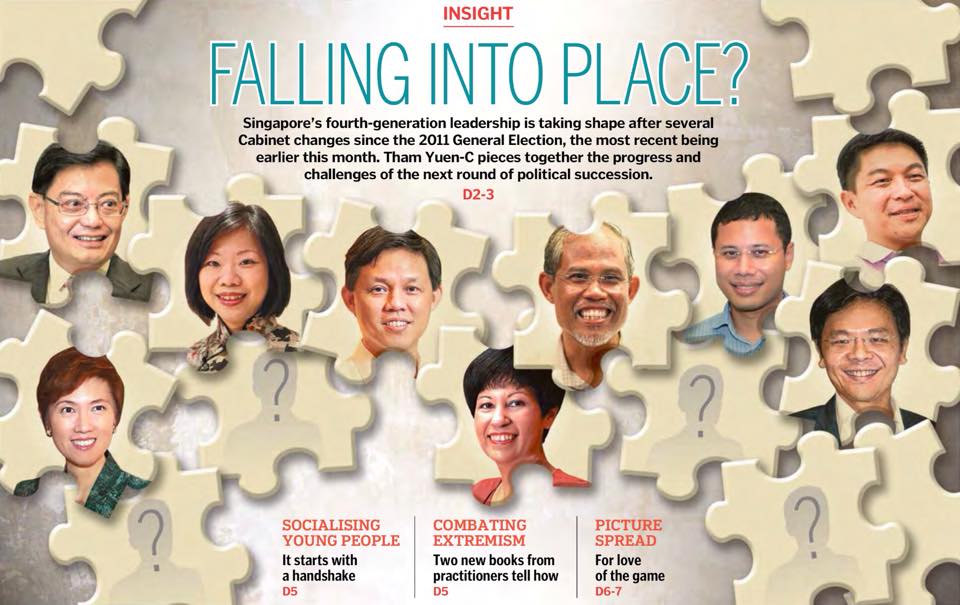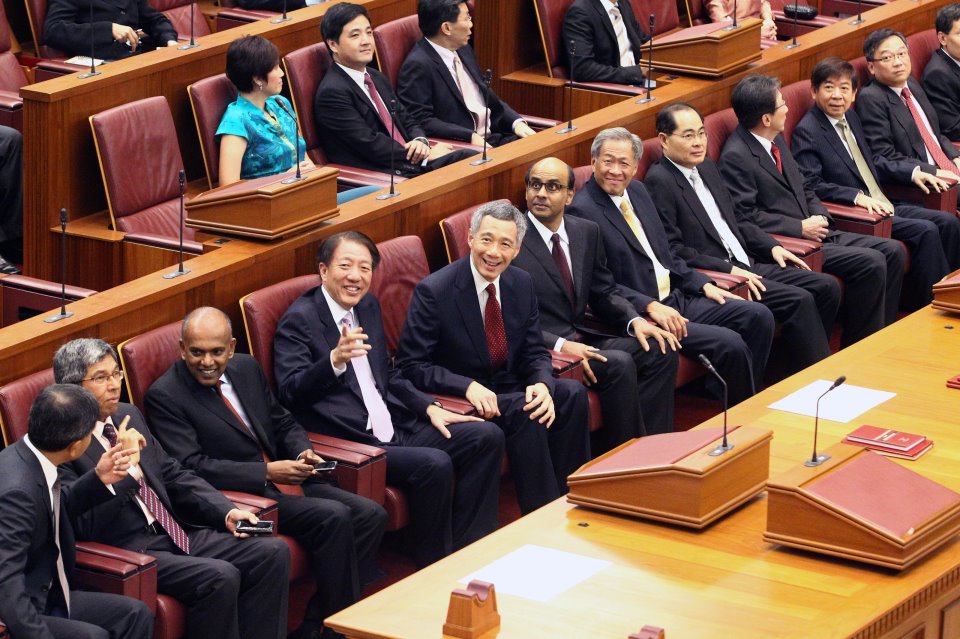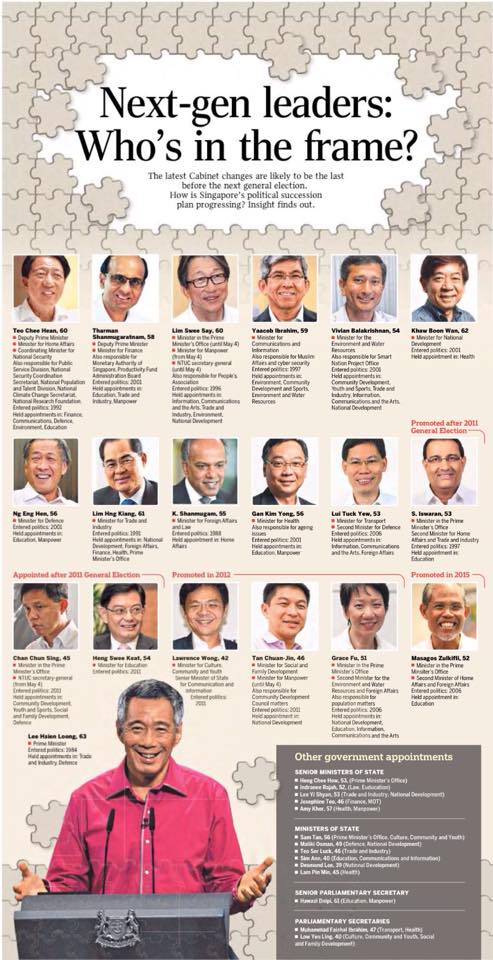Last weekend, The Straits Times carried a feature on whether Singapore's fourth-generation leadership is "falling into place" and who the "next-gen leaders" of Singapore were.
 Source: Screenshot of Straits Times article
Source: Screenshot of Straits Times article
The Straits Times is asking the wrong question.
It should instead ask whether the fourth-generation leaders are ready to steer the nation in the brave new world for the next 20 years.
For instance, does the 19-member cabinet reflect a broad range of experiences and knowledge? How diverse is the cabinet? Are they equipped to tackle the "wicked problems" that defy conventional boundaries?
Below are three observations made about the current cabinet and its diversity.
1. Similar Anglo-American formative experiences - Undergrad years in UK, early adult years in US.
The road to Singapore's highest decision-making body for all government policies and the day-to-day administration of the state narrows at a remarkably early stage in life and narrows even further soon thereafter.
As youngsters, a majority of our cabinet members spent their formative undergraduate years in the United Kingdom and their early adult postgraduate years in the United States. In fact, two Ministers followed the same route as Prime Minister Lee Hsien Loong - Cambridge as an undergraduate; Harvard as a postgraduate.
Below is a quick breakdown:
Undergraduate
Breakdown by country: United Kingdom (10), Singapore (6), Australia (2) and the United States (1).
Breakdown by university: Cambridge University (6), National University of Singapore (6) and London School of Economics (2), Others (5).
Postgraduate
Breakdown by country: United States (12) Singapore (3), United Kingdom (6)*
Breakdown by university: Harvard University (7), National University of Singapore (3), Cambridge University (2), Stanford University (2)
*Some Ministers have two postgraduate degrees.
With the rise of China, none of our Cabinet Ministers have done a postgraduate degree in Tsinghua University or Peking University in China.
On the other hand, our late founding Prime Minister Lee Kuan Yew, who witnessed the fall of the British Empire and the rise of the United States, took a month-long sabbatical at Harvard University to understand the country better.
2. A lack of diversity in career experiences before politics
Following the watershed 2011 General election, before Wong Kan Seng stepped down as the Deputy Prime Minister, the Cabinet has always had at least one member with MNC private sector experience since 1985.
Wong was formerly with Hewlett Packard as a personnel manager, while former finance minister Richard Hu was the CEO of Shell Singapore before he joined the Cabinet in 1985.
Currently, there are four Cabinet members with private sector experiences but only in government-linked companies such as Temasek Holdings, NatSteel, PSA and Singtel.
Below is a comparison between the career experiences between Lee Kuan Yew's first cabinet post-independence and the current cabinet.
| Portfolio | Minister |
|---|---|
| Prime Minister | Lee Kuan Yew |
| Deputy Prime Minister | Dr Toh Chin Chye |
| Minister for Social Affairs | Othman Wok |
| Minister for Defence and Security | Dr Goh Keng Swee |
| Minister for Labour | Jek Yuen Thong |
| Minister for Finance | Lim Kim San |
| Minister for Health | Yong Nyuk Lin |
| Minister for Education | Ong Pang Boon |
| Minister for Foreign Affairs and Culture | S. Rajaratnam |
| Minister for Law and National Development | E. W. Barker |
Source: Newspaper.sg
Lee Kuan Yew's Cabinet in 1965: Businessmen/Private Sector - 30% (Lim Kim San, Yong Nyuk Lin, Ong Pang Boon);
Journalists - 30% (S Rajaratnam, Jek Yuen Thong, Othman Wok);
Professionals - 20% (Lee Kuan Yew, E.W.Barker);
Civil Service (Goh Keng Swee) - 10%;
and Academic (Toh Chin Chye) - 10%;
Current Cabinet: Civil Service - 57.89% (11/19);
Private Sector - 21.05% (4/19);
Professionals (Lawyers and Doctors) - 15.79% (3/19);
Academic - 5.27% (1/19)
11 out of 19 of our current cabinet were from the civil service. The figure would have been higher if both S Iswaran and Gan Kim Yong, who spent their formative working years in the civil service, were included.
Out of the 11 former civil servants, 9 were from the Singapore Armed Forces.
In April 2011, PM Lee acknowledged to NUS students the difficulty of attracting talents from the private sector at the Kent Ridge Ministerial Forum 2011. He said,
"The more opportunities there are in the private sector, especially not just in Singapore but also overseas, in China and India and the Middle East and all over the world, the harder it will be for us to get people to go from that path to come in and become MPs and ministers.
MPs, I can get some, not enough but some. Ministers, very much not enough and I think that is a weakness which we have to try very hard to address. So that's an honest answer".
He added that the challenge was that the talents are "already set in their careers, they know what they're doing; to come in change track, change system, change thinking, may succeed, may not succeed, (is of) high risk to them".
But consider a piece of observation that is, by common consensus, one of the greatest political performances in our last fifty years: Lim Kim San's efforts to house the entire nation as the HDB chairman.
As a savvy leader with business experience, Lim revamped the construction industry, set new policies, manage planners, architects and contractors, and cut red tape by abolishing numerous Singapore Improvement Trust (SIT) committees.
The result? Lim built 26,168 housing units, about the same number built by the colonial SIT in 32 years. And he volunteered his services for free!
3. Diverse teams to tackle challenges of the future
Professor Scott Page of the University of Michigan, who was in Singapore last year, argues that diverse teams are better able to solve problems, because each person offers a different perspective, a different mental model, and therefore a different representation of the problem.
Compared to the first cabinet in 1965, the current cabinet is certainly more diverse in terms of race and gender.
But as our country becomes increasingly diverse, our cabinet's academic and career experiences are becoming more alike.
Eddie Teo, Chairman of the Public Service Commission, recently told his audience in an IPS lunch dialogue that "having a more diverse public service – students from different schools, studying in different universities and countries, taking different courses – is also important because it helps the public service to cope better with the complex, global challenges facing Singapore".
We can of course take heart in the fact that the only ex civil servant in Lee Kuan Yew's cabinet introduced the National Service, built a full-time army, developed Jurong Island and created Jurong Bird Park and the Singapore zoo.
Let's hope that today’s Ministers will rise to the occasion despite their lack of in-depth private sector experiences. But I would feel more confident about a Cabinet that did not lack a crucial advantage of the previous cabinets. May this problem be addressed after the next General Election.
Top photo from Lee Hsien Loong Facebook.
If you like what you read, follow us on Facebook, Instagram, Twitter and Telegram to get the latest updates.

